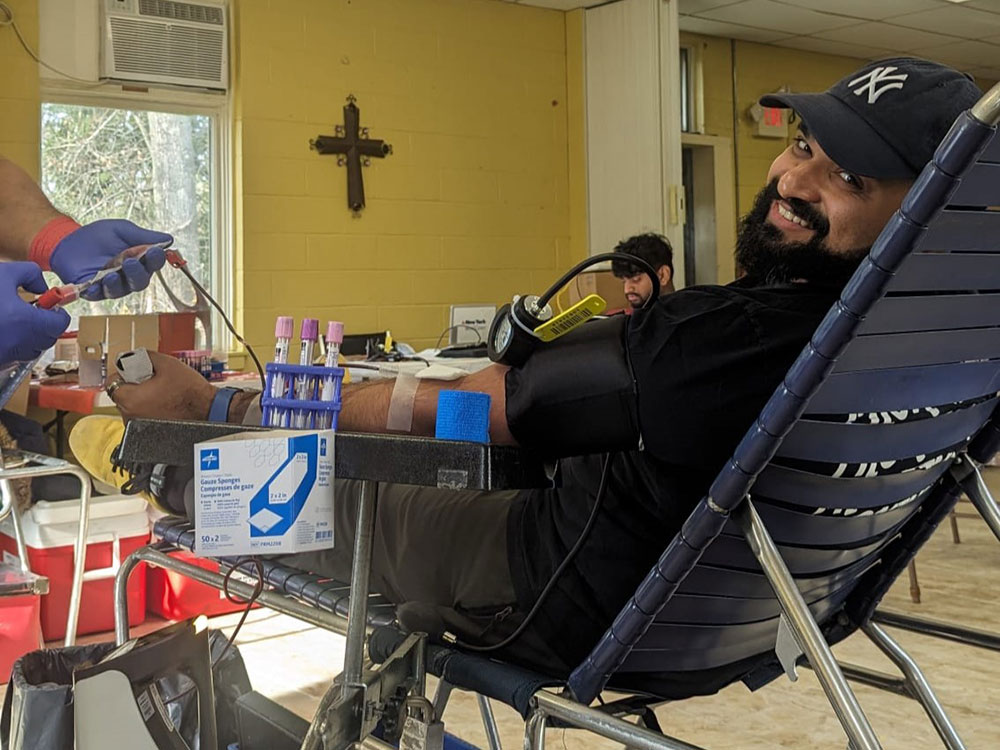
The author's brother donates blood after consulting for tips about how to feel great while making a blood donation.
By: Seethal Sara Thomas, FNP-BC
Blood donation is a lifesaving gift that can be given multiple times a year. A few simple steps can help prepare you, your family, your team, and your community for the donation. Most people donate blood without experiencing other any of the potential symptoms. If feeling dizzy, lightheaded, or nauseated is of concern for you, rest assured that there are ways to help prevent these feelings. I personally donate at least twice a year and am someone who has fainted in the past with other activities. I also get nervous about potentially fainting during blood donation, but I’ve used these help tips for blood donation (and I haven’t fainted yet).
Hydrate, eat, and sleep: It is important to hydrate, eat, and sleep well the day before and the day of your donation. You should already be drinking between 5-8 pints of liquid (not including alcohol) each day, but on the day of your donation — you should also drink an additional pint of water beforehand and an additional cup of water afterwards to reduce feelings of dizziness. To help reduce lightheadedness and nausea, you should eat a meal with iron and protein beforehand. To help feel less tired, you should be sure to get a full night’s sleep and avoid drinking alcohol the night before you donate.
For additional context, most people typically have around 10-13 pints of blood circulating in their body. So, if you are dehydrated before your donation begins, you may experience increased symptoms afterwards. Protein and iron are important nutrients that your body needs to create new blood cells in your body, and you are going to want to have these nutrients ready to go as soon as your donation is finished.
Exercises: A series of simple exercises called applied muscle tension can prevent a drop in blood pressure related to fear. To do this exercise start by crossing your legs at the knees. Next, squeeze your knees/upper legs, tense your abdominal muscles, point your toes, and hold for five seconds. Then, completely relax for five seconds. Next, switch the legs that are crossed and repeat the process on the other side.
An exercise that helps with circulation is ankle pumps. For this, extend your legs out and alternate pointing your toes down and raising your toes back towards your nose. These exercises can be done before, throughout, and after your donation.
Take it easy, hydrate, and eat again: After your blood donation is complete, it is important to get up slowly from the chair. Sudden movements, especially ones from a sitting or lying position to standing, can contribute to lightheadedness. If you experience this, stop what you are doing and sit or lie down until you feel better. Avoid performing any activity where fainting may lead to injury, such as excessive alcohol consumption or strenuous exercise, for at least 24 hours. At the refreshment table, enjoy some snacks, continue to hydrate, and consume iron-rich foods after the donation (here is more information on iron-rich foods).
If at any point you do start to feel symptoms, it is important to communicate this with the Red Cross professional on site. Symptoms are uncommon but they can happen to anyone. The Red Cross takes certain measures to ensure that you are healthy enough to donate blood, such as obtaining a health history, hemoglobin levels, blood pressure, and heart rate prior to donation.
As a Nurse Practitioner, people feel comfortable talking to me about when they feel unwell. Every time I’ve been told by a family member, community member, or friend about feeling any of the described symptoms when they had blood collected — I often find the person did not have enough nutrition, hydration, sleep, or were fearful. There is no guaranteed way to predict whether a person is going to feel symptoms during a blood donation or not. But you should know it is okay if symptoms occur. That’s why there are professionals trained to help with any questions or concerns you may have during the blood donation process.
So don’t be nervous, roll up your sleeve and help save somebody’s life by donating blood.
Every day, blood donors help patients of all ages: accident and burn victims, heart surgery and organ transplant patients, and those battling cancer. In fact, every two seconds, someone in the U.S. needs blood. Visit www.redcrossblood.org to schedule an appointment at a blood drive near you.
Support all the urgent humanitarian needs of the American Red Cross.
Find a drive and schedule a blood donation appointment today.
Your time and talent can make a real difference in people’s lives. Discover the role that's right for you and join us today!